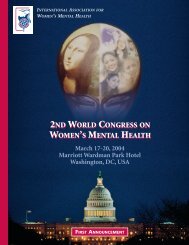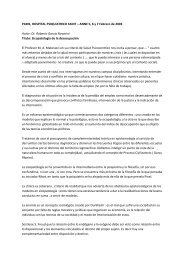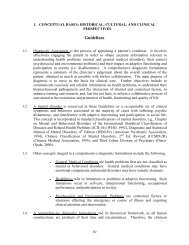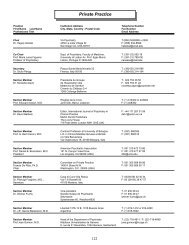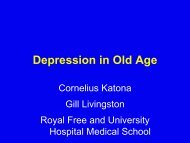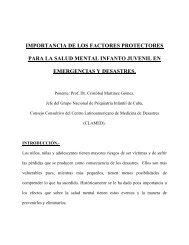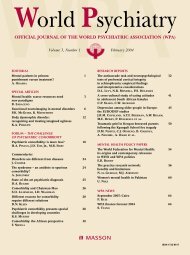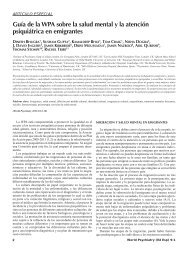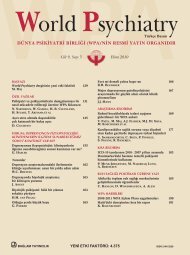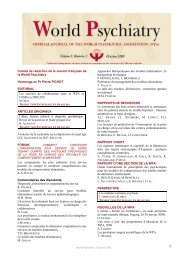ABSTRACTS - World Psychiatric Association
ABSTRACTS - World Psychiatric Association
ABSTRACTS - World Psychiatric Association
You also want an ePaper? Increase the reach of your titles
YUMPU automatically turns print PDFs into web optimized ePapers that Google loves.
ly on pain. In the longer term, somatisation is an important predictor<br />
of health status, but even patients with marked somatisation show<br />
improved health status and reduced costs.<br />
US5.3.<br />
CONSIDERING CONTEXTUAL FACTORS<br />
IN THE MANAGEMENT OF UNEXPLAINED SOMATIC<br />
SYMPTOMS<br />
O. Gureje<br />
Department of Psychiatry, University of Ibadan, Nigeria<br />
The management of medically unexplained somatic symptoms is<br />
challenging. Results of intervention trials have been mixed, making<br />
the development of efficacious guidelines problematic. The difficulty<br />
in designing effective treatment may reflect our poor understanding of<br />
the etiology of the symptoms. In this paper, data from large crossnational<br />
studies are used to highlight the possible role of treatment<br />
settings and of pattern of comorbidity in the profile of unexplained<br />
somatic symptoms. The point is made that developing effective management<br />
for these symptoms requires a consideration of the contextual<br />
factors in their evolution.<br />
US6.<br />
THE FUTURE OF PSYCHOTHERAPIES<br />
FOR PSYCHOSES<br />
US6.1.<br />
THE FUTURE OF COGNITIVE-BEHAVIOURAL<br />
THERAPY IN PSYCHOSIS: WHAT MAKES IT WORK<br />
P. Bebbington, G. Dunn, D. Fowler, P. Garety, D. Freeman,<br />
E. Kuipers<br />
Institute of Psychiatry, London; University of Manchester;<br />
University of East Anglia, Norwich, UK<br />
Our Psychosis Research Partnership (PRP) conducted a large multicentre<br />
randomized controlled trial (RCT) of the effectiveness of cognitive-behavioral<br />
therapy (CBT) in preventing psychotic relapse.<br />
Over 300 people with a recent relapse of positive psychotic symptoms<br />
were randomized. Those with consenting carers were allocated to<br />
receive CBT, family intervention or treatment as usual; those who<br />
lacked carers or whose carers declined were randomized to CBT or<br />
treatment as usual. The CBT and family intervention had no effects<br />
on rates of remission and relapse or on days in hospital at 12 or 24<br />
months. For secondary outcomes, CBT showed a beneficial effect on<br />
depression at 24 months, but there were no effects for family intervention.<br />
In people with carers, CBT significantly improved delusional<br />
distress and social functioning. These results suggest that generic<br />
CBT for psychosis is not indicated for routine relapse prevention in<br />
people recovering from a recent relapse of psychosis and should currently<br />
be reserved for those with distressing medication-unresponsive<br />
positive symptoms. Secondary analyses of RCTs require very careful<br />
consideration, as approaches such as per protocol analyses lose the<br />
benefits of randomisation and lead to impermissible inferences. Nevertheless,<br />
techniques are now available that enable the effects of moderating<br />
variables such as therapeutic alliance and treatment quality to<br />
be modelled in a valid manner. Applying these techniques to our data,<br />
it became clear that CBT, if effectively delivered, as it was in a third<br />
of cases, reduced Positive and Negative Syndrome Scale (PANSS)<br />
scores by 24 and 13 (12 month and 24 month follow-up respectively).<br />
The equivalent results for depression as measured by Beck Depression<br />
Inventory (BDI) score were 4 and 12.<br />
US6.2.<br />
THE FUTURE OF COGNITIVE-BEHAVIOURAL<br />
THERAPY IN PSYCHOSIS: FOCUSSING ON SOCIAL<br />
RECOVERY<br />
D. Fowler<br />
School of Medicine, Health Policy and Practice, University<br />
of East Anglia, Norwich, UK<br />
The development of cognitive-behavioural therapy (CBT) for psychosis<br />
has now reached a critical juncture. Recent meta-analyses provide<br />
now firm evidence for the efficacy of CBT for treatment resistant<br />
psychosis. On the other hand, the effect sizes on symptoms are relatively<br />
modest and the results from some recent large scale trials<br />
appear equivocal. One way forward is to focus on more specific subgroups.<br />
Another way forward is refocusing the target of CBT toward<br />
social recovery rather than on symptom management. A focus on<br />
social recovery would fit well into a growing agenda which highlights<br />
the importance of addressing outcomes which have the greatest relevance<br />
for users, and wider interest in understanding social capital as<br />
well as traditional clinical outcomes. Recent meta-analyses have<br />
already shown that CBT has a consistent effect on social outcomes<br />
where these have been measured as secondary outcomes. We have<br />
recently undertaken a trial of a new approach to CBT which directly<br />
addresses social recovery in psychosis as a primary outcome. This<br />
trial has shown substantive gains in improving time spent in constructive<br />
and social activity and in clinical outcomes at post treatment,<br />
and in promoting time in employment at 2 years. It suggests<br />
that CBT could provide a useful adjunct to existing interventions to<br />
improve social functioning such as supported employment.<br />
US6.3.<br />
FAMILY-BASED PSYCHOSOCIAL INTERVENTIONS<br />
FOR PSYCHOSIS: AN UPDATE<br />
W.R. McFarlane<br />
Maine Medical Center, Portland, ME, USA<br />
As emphasis in treatment of schizophrenia shifts increasingly to early<br />
identification and intervention in, or prior to, the first episode of psychosis,<br />
the design and implementation of psychosocial treatment has<br />
become crucial. Within this preventive orientation, emphasis has also<br />
moved beyond prevention of psychosis to promoting recovery to the<br />
level of functioning that most closely resembles that of the previous or<br />
potential level. It has become clear that therapeutic drugs alone are<br />
inadequate to achieving goals pertaining to cognition and psychosocial<br />
functioning. At the same time, it has also become clear that family-based<br />
psychosocial therapies not only promote improved functioning and<br />
restoration of personality, but also contribute independently to prevention<br />
of psychotic episodes, whether they are relapses or the first. These<br />
treatment approaches have been developed by independent teams in<br />
several nations, leading to a broad consensus of effective elements and<br />
practices, lending additional credibility to their results. They share the<br />
core strategy of helping the patient and the immediate social network to<br />
enhance their knowledge and to develop coping skills to compensate<br />
for, or even reverse, core neurocognitive deficits. Unlike psychiatric<br />
drugs, they have not been implemented widely, even in their countries of<br />
origin. Starting from biosocial theory, this presentation describes proven<br />
and currently developing family-based psychosocial interventions, their<br />
distinctive features and differences and published or available interim<br />
results. Particular emphasis is given to those based on cognitive-behavioral<br />
precepts, including family psychoeducation, supported education<br />
and employment, and assertive community treatment. Also reviewed is<br />
their combination: family-aided assertive community treatment.<br />
11



